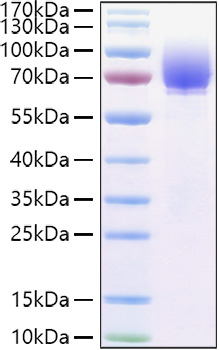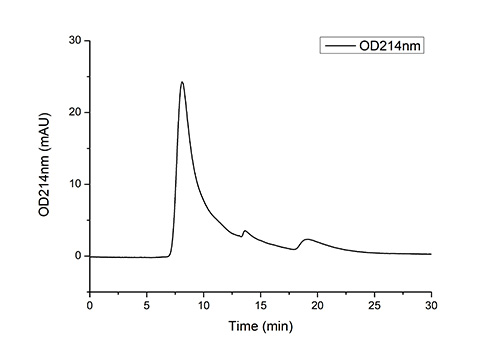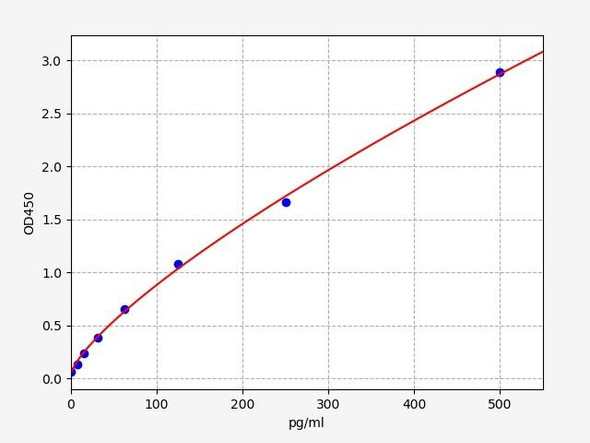Description
Recombinant Human Microtubule-associated protein tau/MAPT Protein
The Recombinant Human Microtubule-associated protein tau/MAPT Protein is a biologically active recombinant protein that plays a significant role in various cellular processes and signaling pathways in human biology. This protein is widely employed in immunological research, cell biology studies, protein-protein interaction analyses, and therapeutic development, providing researchers with a reliable tool for investigating Microtubule-associated protein tau/MAPT function and its implications in health and disease.
This product (SKU: RPCB1405) is produced using HEK293 cells and features a C-His tag for convenient detection and purification. The protein exhibits a calculated molecular weight of 46.69 kDa with an observed molecular weight of 65-80 kDa under denaturing conditions, achieving ≥ 95 % as determined by SDS-PAGE;≥ 90 % as determined by HPLC., ensuring exceptional quality and consistency for research applications.
Key Features
| High Purity by Affinity Chromatography | |
| Mammalian & Bacterial Expression Systems | |
| High lot-to-lot consistency via strict QC |
| Product Name: | Recombinant Human Microtubule-associated protein tau/MAPT Protein |
| SKU: | RPCB1405 |
| Size: | 20 μg , 50 μg , 100 μg |
| Reactivity: | Human |
| Synonyms: | DDPAC, FTDP-17, MAPTL, MSTD, MTBT1, MTBT2, PPND, PPP1R103, TAU, MAPT, FTDP-17, MAPTL, MSTD, MTBT1, MTBT2, PPND, PPP1R103, TAU, Tau, DDPAC, microtubule-associated protein tau |
| Tag: | C-His |
| Expression Host: | HEK293 cells |
| Calculated MW: | 46.69 kDa |
| Observed MW: | 65-80 kDa |
| Gene ID: | 4137 |
| Protein Description: | High quality, high purity and low endotoxin recombinant Recombinant Human Microtubule-associated protein tau/MAPT Protein (RPCB1405), tested reactivity in HEK293 cells and has been validated in SDS-PAGE.100% guaranteed. |
| Endotoxin: | < 0.1 EU/μg of the protein by LAL method. |
| Purity: | ≥ 95 % as determined by SDS-PAGE;≥ 90 % as determined by HPLC. |
| Formulation: | Lyophilized from a 0.22 μm filtered solution of PBS, pH 7.4. |
| Reconstitution: | Centrifuge the vial before opening. Reconstitute to a concentration of 0.1-0.5 mg/mL in sterile distilled water. Avoid vortex or vigorously pipetting the protein. For long term storage, it is recommended to add a carrier protein or stablizer (e.g. 0.1% BSA, 5% HSA, 10% FBS or 5% Trehalose), and aliquot the reconstituted protein solution to minimize free-thaw cycles. |
| Storage: | Store at -20℃.Store the lyophilized protein at -20℃ to -80 ℃ up to 1 year from the date of receipt. After reconstitution, the protein solution is stable at -20℃ for 3 months, at 2-8℃ for up to 1 week. |
MAPT (microtubule-associated protein tau) can produce tau proteins. Tau proteins are proteins that stabilize microtubules. They are abundant in neurons of the central nervous system and are less common elsewhere, but are also expressed at very low levels in CNS astrocytes and oligodendrocytes. When tau proteins are defective, and no longer stabilize microtubules properly, they can result in dementias such as Alzheimer"s disease. Tau protein is a highly soluble microtubule-associated protein (MAP). In humans, these proteins are mostly found in neurons compared to non-neuronal cells. One of tau"s main functions is to modulate the stability of axonal microtubules. Other nervous system MAPs may perform similar functions, as suggested by tau knockout mice, who did not show abnormalities in brain development - possibly because of compensation in tau deficiency by other MAPs.Tau-F is known as "2N4R," "Isoform Tau-F," "Tau-4" or "Tau 441", which consisting of 441 amino acid. Tau-F is a potential therapeutic target for pathogenesis.








